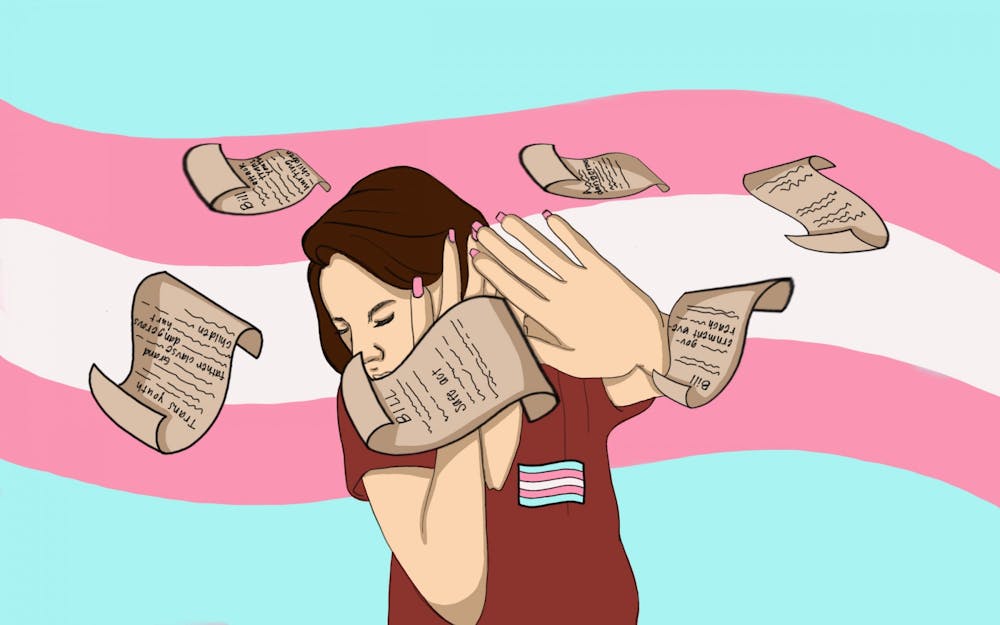Nearly one in 50 high school students identifies as transgender in the United States, according to a 2019 study by the Centers for Disease Control and Prevention. The same study reported 35% of these students had attempted suicide in the past year.
When transgender children who wish to physically transition are given access to gender affirming treatment, such as puberty blockers and hormone therapy, they are less likely to experience suicidal ideation or attempt suicide.
Yet trans rights in America are moving backward. Last week, Arkansas became the first U.S. state to completely ban gender-affirming care for children.
The Arkansas state legislature passed House Bill 1570 on April 6. It prohibits doctors from providing puberty blockers and hormone therapy for transgender people under the age of 18.
In short, it bans trans youth from physically transitioning at all. The state’s legislature has jeopardized the life of every single transgender child living in Arkansas, denying them the most basic of all human rights: to exist.
Carrick Moon, a junior who founded the IU Queer Student Union and recently ran for student body president, said this bill will have serious consequences for transgender youth.
“It’s very blunt: It’s life or death for a lot of kids,” he said. “When you deny this access to trans individuals and trans youth, it absolutely results in suicide.”
A 2020 study which surveyed more than 20,000 transgender adults found only 2.5% of those who wanted gender-affirming treatment were actually able to access it. The Massachusetts General Hospital study also found treatment lowered the odds of lifetime suicidal ideation.
Moon, a transgender man, said laws such as Arkansas’ increase rates of depression and make success and happiness difficult to achieve.
Arkansas is not halting its war on transgender individuals at the ban of gender-affirming care.
The state’s legislature passed a measure April 9 that would allow teachers to identify transgender children by their dead name and use incorrect pronouns to address them without facing any legal consequences.
The legislation’s chief sponsor, Rep. Mary Bentley, R-AR., compared the use of a transgender child’s preferred name and pronouns to them identifying as “as a cat” or “as a furry.” Needless to say, her comments and actions are steeped in incredible ignorance.
There has been ongoing debate brought on by people who refuse to use a transgender individual’s name and pronouns, simply based on the argument it makes them uncomfortable. Additionally, this same argument has been used in attempts to ban transgender individuals from using their bathroom of choice or to prohibit trans students from playing sports.
Moon said the work of dealing with this argument has become exhausting for the trans community.
“You’re asking trans individuals to compromise themselves and strip themselves down into something you can palate,” he said. “You’re turning it into a debate of whose comfort matters more, regardless of who it harms. And that is a really disappointing debate to have.”
Indiana’s environment is already difficult for trans individuals, and the potential passage of bills similar to the ones in Arkansas is extremely disheartening.
The Indiana State House introduced House Bill 14-56 in January, which, if passed, would make it illegal for for transgender people to use a bathroom that does not correspond with their sex assigned at birth.
As students, it is difficult to push back against these laws on a national level, but we still have the power to incorporate change locally and create a safer space for LGBTQ+ students at IU, Moon said.
“Even though Indiana is a deep red state, there is a lot that we can do as students when we commit to just looking out for each other,” he said. “Whether that’s asking for a person’s pronouns when we meet them to make sure that if a trans or nonbinary individual is present, that they feel more secure. We can also call for mandatory diversity training that incorporates a queer lens.”
It is important that everyone — regardless of their gender identity — recognizes the harm these laws are causing and come together in an act of solidarity for the trans community.
Rama Sardar (she/her) is a freshman majoring in media with a concentration in film. She aspires to be a screenwriter and film director.






